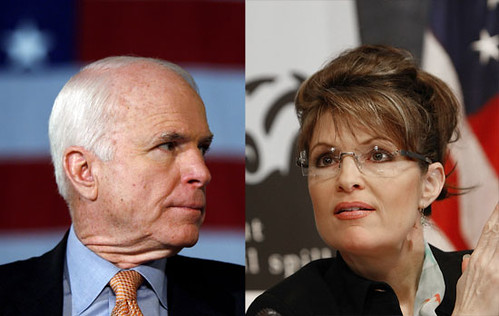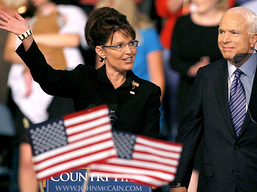In a breathtakingly puzzling move, John McCain showed terrible judgment by selecting first term Alaska Governor Sarah Palin to be his running mate. Despite the spin that desperate Republicans immediately parroted, it wasn't a brilliant pick, or a game-changer. It was an amazingly bad choice.

Palin's shortcomings have been documented in an instant feeding frenzy among journalists and bloggers. She is the least known, least experienced VP nominee in modern political history. Those who compare her to George H. W. Bush's choice of Dan Quayle in 1988 forget that Quayle had already been in Congress for 12 years.
By contrast, Palin took office as Governor in December, 2006, less than two years ago. Before that, she served two terms on the city council and then as mayor from 1996-2002 of Wasilla, Alaska, a town with a population under 9,000. That's less than 1/20th the size of the Illinois State Senate district Barack Obama represented for eight years before he was elected to the U.S. Senate.
What a way to undercut McCain's central argument that Obama doesn't have enough experience to serve as president or commander in chief.
Of course, McCain hardly knows her. He first met Palin only in February of this year, at a governor's conference. The next time he saw her was last Wednesday, the night after Hillary Clinton's rousing address to the Democratic Convention. McCain may have been worried about losing diehard Clinton supporters to Hillary's cry of "No way, no how, no McCain!" On Thursday morning, he offered her the job.
If he thinks Hillary Democrats will cheer and fall in line behind Sarah Palin, McCain is in for a rude awakening. Palin's gender is the only thing she has in common with Hillary Clinton. She is an extreme right winger who is anti-abortion to the core, doesn't think global warming is man made, and enthusiastically supports oil drilling in the Arctic National Wildlife Refuge.

Sarah Palin at her office in Alaska
Billed by McCain as bearing "a message of reform and public integrity," Palin is currently under investigation herself. A few weeks ago, a bipartisan panel of Alaska state legislators appointed an independent investigator to look into charges that Palin abused her office. In mid-July she fired the Alaska public safety commissioner, allegedly after he refused to dismiss her former brother-in-law, a state trooper who divorced Palin's sister three years ago and was locked in a custody dispute over their child.
Announced on his 72nd birthday, this pick follows a string of McCain gaffes, memory lapses, and episodes of forgetfulness on the campaign trail. As reported by Talking Points Memo:
"McCain frequently forgets key elements of policies, gets countries' names wrong, forgets things he's said only hours or days before and is frequently just confused."
It all raises the uncomfortable question of whether McCain might be exhibiting signs of Alzheimer's disease.
I don't take the subject of Alzheimer's lightly. My grandfather died of complications from the disease, and I watched his mind waste away over a period of several painful years. But it's a question that must be asked in view of John McCain's age. If elected, he would be the nation's oldest president in history.
According to the national Alzheimer's Association, the leading voluntary health organization for Alzheimer care, support and research, one of the top ten warning signs of the disease is poor or decreased judgment. The number one warning sign is memory loss.
The last septuagenarian in the White House, Ronald Reagan, exhibited symptoms of forgetfulness and mental degeneration before leaving office, although his Alzheimer's diagnosis was only made public in 1994. Former White House correspondent Lesley Stahl wrote in her book Reporting Live that she and other reporters suspected Reagan was "sinking into senility" as early as 1986, but aides "covered up his condition" and editors chose not to cover it.
History seems to be repeating itself, because the press is not devoting nearly enough attention to McCain's well-documented memory problems.
There are certainly other explanations for why McCain went with Palin. Earlier this summer McCain suggested he might pick a pro-choice running mate, like former Pennsylvania Governor Tom Ridge, and anti-abortion Republicans went ballistic. So he may have caved to the right wing, and delivered up a candidate to their liking.

The National Review gushed over Palin, saying McCain had "wowed the public and enthused the right." Other more clear headed conservatives were a little subdued. Even Republican strategist Ed Rollins, Reagan's former political director, hedged his bets by calling it a "brilliant, but risky choice" for McCain. Rollins did admit the Republican Party was "in desperate need of young people and women role models."
But this VP pick is the most questionable decision yet from John McCain. He passed over numerous plausible Republican contenders and failed to pick someone remotely qualified for the job.
Going with the white-haired Arizona Senator was once a "safe choice" for voters hesitant to embrace Obama's message of change. Putting Sarah Palin a heartbeat away from the White House has made McCain's candidacy a much bigger risk. It's fair to ask whether John McCain is mentally fit to be president.
(UPDATE 9/1: My Dad, of all people, gave me an interesting scoop about John McCain earlier today that's relevant to this post. Seems he recently met someone who has flown with McCain on multiple occasions. This source says McCain looks much older in person than when made up for TV interviews, it's clear he's "got some serious mileage on him." And although McCain does his best to come across as energetic on the campaign trail, in reality, he can more accurately be described as a "tired old man." This is a direct observation from someone who's seen McCain up close and personal more times than most voters ever will, and reinforces concerns about his age. In my Dad's words, this source was "very believable," and that's good enough for me.)



No comments:
Post a Comment